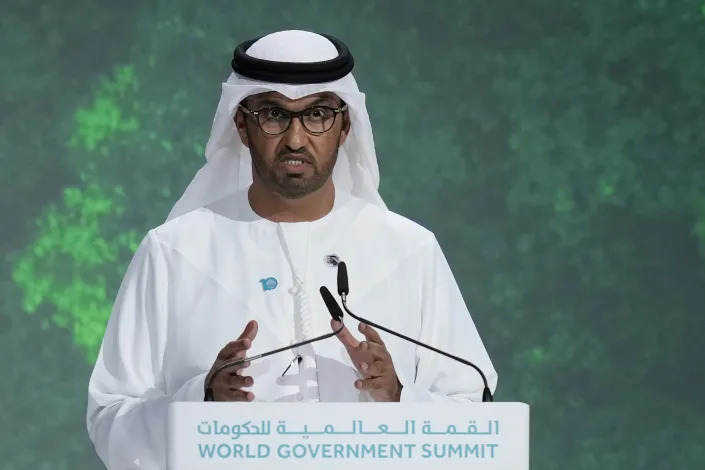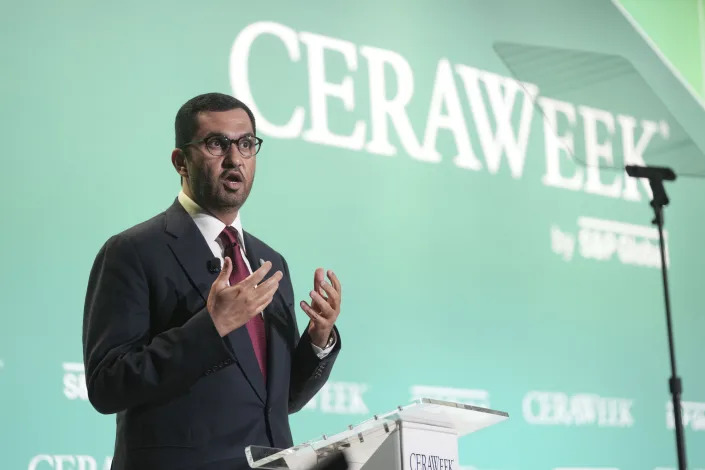"I think if you're going to go through the greatest transformation that the world has seen in over 100 years, of unplugging from one energy system and creating a whole other one, you can't just do it without planning it out,"

The CERAWeek 2023 energy conference in Houston
Mon, March 6, 2023
By Stephanie Kelly and Sabrina Valle
HOUSTON (Reuters) - Top global energy executives and officials on Monday grappled with how to transition the global economy from fossil fuels to renewables quickly enough to prevent climate disaster without disrupting strategic oil and gas supplies.
"Houston, we have a problem," two top executives told some of the most powerful figures in global energy in the capital of the U.S. oil industry, using the same famous line from an astronaut in the damaged 1970 Apollo 13 spacecraft.
Sultan al-Jaber, chief executive of Abu Dhabi National Oil Company and president-designate of the COP28 climate summit, used the line to urge conference participants to do more faster to limit global warming, which the fuel produced by most of energy companies present had accelerated.
Earlier, Petronas CEO Tengku Muhammad Taufik used the same phrase in a panel discussion on the challenge of balancing the need for energy security and affordability.
Jaber's call for energy companies to work toward the transition was an unusual moment at an event that has long been a mainstay for fossil fuel producers, who have previously viewed such calls as a threat to their business.
Last year, many climate activists balked at Jaber's appointment as COP28 president, saying Big Oil was hijacking the world's response to global warming. Others welcomed it as a sign the energy industry would get involved in the transition.
Russia's invasion of Ukraine sparked an energy crunch that disrupted fossil fuel supplies to industry and consumers. Rising fuel prices fueled decades-high global inflation in 2022.
Many in the industry viewed the disruptions to Russian supply as a reminder to avoid policies that cut off or drive up prices for fossil fuels. Chevron Chief Executive Mike Wirth told attendees that maintaining secure and affordable supplies while managing the energy transition to the low-carbon economy was "one of the greatest challenges of all time."
A disorderly energy transition could be "painful and chaotic", Wirth said.
"We have to be very careful about turning system A off prematurely and depending on a system that doesn't yet exist and hasn't been proven," he said.
Disruptions of gas supply to Europe, which has hurt the largest economy on the continent in Germany, have accelerated the transition, said German state secretary in the economy ministry, Patrick Graichen.
"If you are used to cheap Russian gas and you wake up in this world, there are some fundamental questions that need to be answered," he said. Germany needed to fast forward electrification and build a green hydrogen supply, he said.
"If we can speed that up and fit it together - it's not about securing the old world but speeding up the transition to the new world."
Top U.S. oil firm Exxon said each country would take a different path to energy transition, depending on the resources available. In some countries, gas would be a transition fuel, said Liam Mallon, the president upstream oil and gas at Exxon.
Mallon called on policymakers and international and national oil companies to map out the transition together.
"We cannot do this alone," he said. "This takes policymakers regulators, innovators, NOC these IOC is all working together to create the right incentives to progress through this energy transition"
U.S. energy envoy Amos Hochstein said the hardest part of the energy transition was coordinating the timeline for change.
"I think if you're going to go through the greatest transformation that the world has seen in over 100 years, of unplugging from one energy system and creating a whole other one, you can't just do it without planning it out," Hochstein said.
(Writing by Simon Webb; Editing by David Gregorio)
Oil CEO who will head 2023 climate talks calls for change


Sultan al-Jaber, CEO of the Abu Dhabi National Oil Co., speaks at Ceraweek on Monday, March 6, 2023, in Houston. Al-Jaber, who will lead international climate talks later this year, told energy industry power players on Monday that the world must cut emissions 7% each year and eliminate all emissions of the greenhouse gas methane. (Courtesy of Ceraweek)
ISABELLA O'MALLEY
Mon, March 6, 2023
A top oil company CEO who will lead international climate talks later this year told energy industry power players on Monday that the world must cut emissions 7% each year and eliminate all releases of the greenhouse gas methane — strong comments from an oil executive.
“Let me call on you to decarbonize quicker,” Sultan al-Jaber, CEO of the Abu Dhabi National Oil Co., said at the Ceraweek conference, held in Houston.
But al-Jabar did not directly address emissions from transportation, where most crude oil ends up. Emissions from transport are the largest contributor to climate change in many countries, including the United States.
Al-Jaber singled out electricity, cement, steel and aluminum as targets for cleanup, but not trucks, cars, trains and aircraft. He called for far greater investment to speed the transition to cleaner industries.
“According to the IEA, in 2022, the world invested $1.4 trillion in the energy transition,” he said. “We need over three times that amount.”
And that investment. he said, must flow to the developing world.
“Only 15% of clean tech investment reaches developing economies in the global south, and that is where 80% of the population live,” he stressed.
Al-Jaber did not call for the phasing out of oil and gas production and use, something that scientists and advocates have been demanding unsuccessfully over repeated COPs, short for Conference of the Parties, where nations meet to make climate commitments.
According to the International Energy Agency, to avoid the worst climate changes, there must be no new oil and gas infrastructure built out.
The United Arab Emirates leader said his country was first in its region to commit to the Paris climate agreement, and to set a pathway to net zero emissions. But its emissions in 2021 were up 3%, not down, from the year before, according to the Global Carbon Project. They were however 6% below the country’s peak in 2015. According to Climate Action Tracker, UAE has an overall rating of “highly insufficient,” meaning its projected emissions are not in line with limiting warming to 1.5 degrees Celsius.
The Abu Dhabi National Oil Co. pumps approximately 4 million barrels of crude a day and plans on expanding to 5 million barrels daily.
Each year, nations gather at the COP to discuss how Paris Agreement goals to limit global warming to just 1.5 degrees Celsius (2.7 degrees Fahrenheit) by 2050, can be achieved through international collaboration.
The 28th such conference, COP28, will be held in Dubai, Nov 30 to Dec. 12. The choice of country has drawn criticism given the nation’s high, and growing level of crude production. The choice of al Jaber, CEO of the national oil company, has also drawn scorn. However, U.S. Climate Envoy John Kerry has said he backs the UAE leader.
As president of this year's meeting, al-Jaber will have influence over how much pressure is brought to bear on those most reponsible for climate change, countries and companies that produce and burn coal, oil and gas.
Al-Jaber is the UAE minister of industry and advanced technology, and also serves as the chairman of Masdar, a renewable energy company.
Ceraweek attracts high level oil and gas officials each year and is hosted by S&P Global.
___
Ellen Knickmeyer contributed from Washington D.C. and Mary Katherine Wildeman from Hartford, Connecticut.
___
Associated Press climate and environmental coverage receives support from several private foundations. See more about AP’s climate initiative here. The AP is solely responsible for all content.
No comments:
Post a Comment